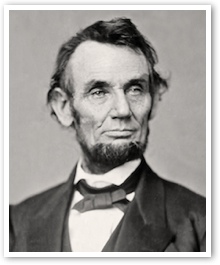A perfect miracle of public utterance
- REX MURPHY
150 years later, Rex Murphy explains the power of the Gettysburg Address.
 |
Four score and seven years ago, our fathers brought forth on this continent, a new nation, conceived in Liberty, and dedicated to the proposition that all men are created equal.
Now we are engaged in a great civil war, testing whether that nation, or any nation so conceived and so dedicated, can long endure. We are met on a great battlefield of that war. We have come to dedicate a portion of that field, as a final resting place for those who here gave their lives that that nation might live. It is altogether fitting and proper that we should do this.
But, in a larger sense, we cannot dedicate — we cannot consecrate — we cannot hallow — this ground. The brave men, living and dead, who struggled here, have consecrated it, far above our poor power to add or detract. The world will little note, nor long remember what we say here, but it can never forget what they did here. It is for us the living, rather, to be dedicated here to the unfinished work which they who fought here have thus far so nobly advanced. It is rather for us to be here dedicated to the great task remaining before us — that from these honored dead we take increased devotion to that cause for which they gave the last full measure of devotion — that we here highly resolve that these dead shall not have died in vain — that this nation, under God, shall have a new birth of freedom — and that government of the people, by the people, for the people, shall not perish from the earth.
The coming week marks the 150th anniversary of Abraham Lincoln's delivery of what has become known as the Gettysburg Address. He spoke it on November 19, 1863, at the dedication of the Soldier's National Cemetery, just a little more than four months after the epic Union victory at Gettysburg.
Its beginning phrase, "four score and seven years ago," has become so well known that it's almost risen to the level of folklore. These six words are a key to what Lincoln is doing with the remaining 272: He deliberately sets a formal, deliberate tone, while avoiding the obvious or colloquial ("87 years ago"), and choosing to echo a biblical phrasing (Psalms: "The days of our years are threescore years and ten"). The deliberate archaizing of the phrase also amounts to a call to attention.
Lincoln follows this with a brilliant, condensed précis of the American idea: "Conceived in Liberty ... all men are created equal."
The second sentence leaps from the distant founding of America to its then-terrible present moment and place. He declares the Civil War (which was to continue for another year and a half ) as the "test" of whether a nation founded on such ideals "can survive."
The Gettysburg Address is a perfect miracle of public utterance... |
But Lincoln goes beyond framing the war as a test of national ideals. The language of the address, and its stately and solemn unfolding, set the Civil War as an interposition of a kind of Fate, or Providence, sent to test America — to settle the question of whether "any nation so conceived and so dedicated, can long endure." It is a brilliant turn of thought.
Then he turns to eulogy proper, and the subtle reversing of the normal eulogic energies: It is not the living who gather to honour the dead; rather, the dead consecrate the living.
It ends on a pledge to the warriors of Gettysburg field, to God himself — that they resolve to save the nation. This part contains one of the plainest passages of the entire address — its whole charge riding on a triplet of prepositions: "by," "of" and "for." The aphorism "of the people, by the people, for the people" captures in nine words the government all of us know (or should know).
Finally, he reverts to the solemn Biblical echoes of his beginning: "perish from the earth." The phrase brings the whole fiercely compressed but irresistibly persuasive address to what Eliot called a "dying close."
The Gettysburg Address is a perfect miracle of public utterance, of great weight and dignity — virtues not as present as we would like in these latter days.
 This is Meaghen Gonzalez, Editor of CERC. I hope you appreciated this piece. We curate these articles especially for believers like you.
This is Meaghen Gonzalez, Editor of CERC. I hope you appreciated this piece. We curate these articles especially for believers like you.
Please show your appreciation by making a $3 donation. CERC is entirely reader supported.

Acknowledgement
Rex Murphy, "A perfect miracle of public utterance." National Post (November 16, 2013).
Reprinted with permission of the National Post.
The Author

 Rex Murphy was host of CBC Radio One's Cross-Country Checkup, a nation wide call-in show, for 21 years before stepping down in September 2015. Murphy is a frequent presence on the various branches of the CBC. He has regular commentary segments entitled "Point of View" on The National, the CBC's flagship nightly news program. See Rex's TV commentaries. In addition, he writes book reviews, commentaries, and a weekly column for the National Post. He is the author of Canada and Other Matters of Opinion and Points of View.
Rex Murphy was host of CBC Radio One's Cross-Country Checkup, a nation wide call-in show, for 21 years before stepping down in September 2015. Murphy is a frequent presence on the various branches of the CBC. He has regular commentary segments entitled "Point of View" on The National, the CBC's flagship nightly news program. See Rex's TV commentaries. In addition, he writes book reviews, commentaries, and a weekly column for the National Post. He is the author of Canada and Other Matters of Opinion and Points of View.




